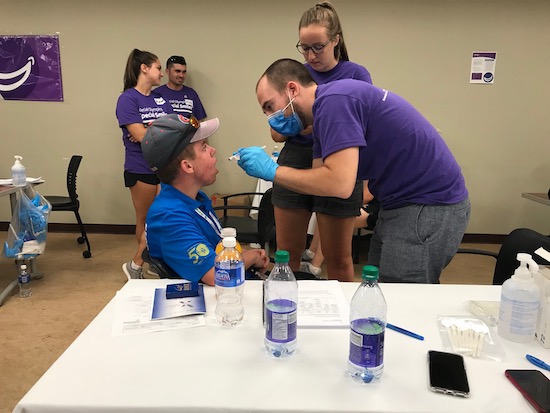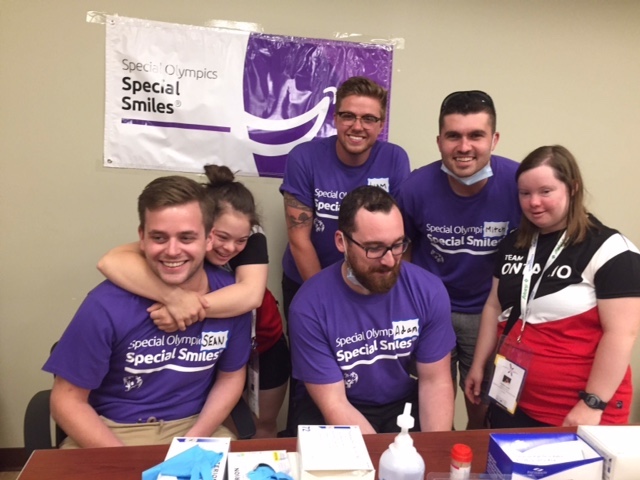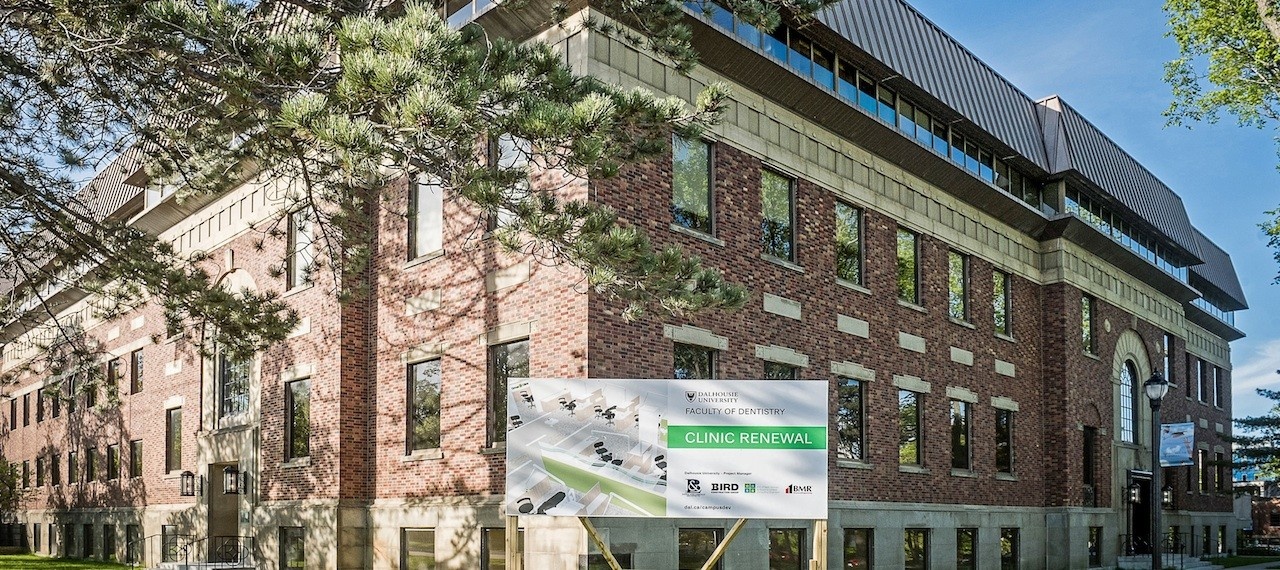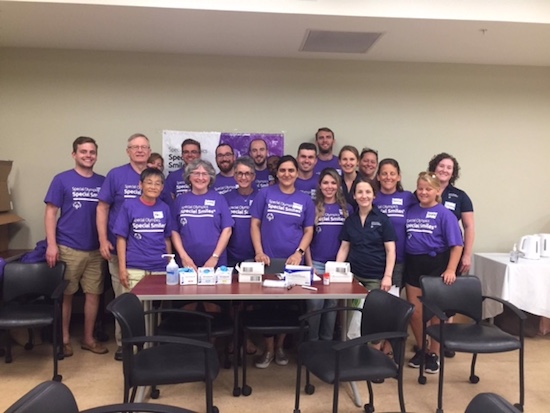News
» Go to news mainPutting the "special" in the Special Olympics
Some of the many volunteers who made up the Special Smiles team
Playing host to the National Special Olympics (SO) in Antigonish, July 31-August 4, 2018, was a first for Nova Scotia. It was also a “transformative” and “life-changing” new experience for a volunteer team from Dalhousie University’s Faculty of Dentistry who were there as part of the Special Olympics Healthy Athletes program.
Paediatric dentistry professor and Healthy Smiles clinical director Dr. Tracy Doyle recruited over 40 dentistry and dental hygiene faculty, staff, alumni, and students to spend some of the hottest days of the summer in a room at the Schwartz School of Business at St. Francis Xavier University.
Their job was to carry out oral health screenings, make mouthguards for the athletes who needed them, provide fluoride treatments, offer oral health care education, and send every athlete away with a goody bag of oral health supplies. Other Healthy Athletes teams from Dalhousie provided vision, audiology, and podiatry checks.
“Individuals with intellectual and physical challenges have a lot of unmet health needs,” says Dr. Doyle.
“That was why Eunice Shriver Kennedy started what became the Special Olympics in the 1960s. She believed that if people with intellectual difficulties were given the same opportunities as everyone else, they could accomplish more. Being able to compete and play sports is one opportunity and receiving treatment for their health needs is another. I was lucky to receive training for the Special Olympics from Dr. Steve Perlman, the paediatric dentist who founded the Special Smiles screening program. He has been a great advocated for children’s healthcare in the US.”

DDS students perform an oral health screening on an athlete
Seeing the impact of dental care across the country
Over the course of the four days of the games, more than 1000 athletes with autism, Down syndrome, and other intellectual disabilities passed through the Healthy Smiles room. They arrived in ones and twos, usually with their coaches. And then whole teams descended, galvanizing every available volunteer into action. In one afternoon alone, over 300 athletes were seen.
For the volunteers, it was an opportunity to witness at first hand the impact of dental health care coverage across the country.
Dental hygiene professor Teanne MacCallum says, “Every province has different coverage and we know that hygiene is expensive. We saw an athlete from New Brunswick who came in with an abscess and a decayed tooth and he said he didn’t have the money to have it looked after. We were able to reach out to one of our alumni in New Brunswick and ask him to help.”
The volunteer team found that the athletes were generally well looked after in terms of cavities and decay, but the level of hygiene was concerning.
“What we are seeing are some dietary concerns,” says dental hygiene professor Shauna Hachey, “particularly the consumption of pop, juice, and sports drinks.”
The difficulty of access to care was a common refrain. “Some parents don’t acknowledge that there is a problem with their children’s teeth,” says assistant dean of academics Dr. Debora Matthews. “The coaches told us stories of some athletes who have never seen a dentist.”
In fact, the coaches were often instrumental in getting care for the athletes. “We saw two brothers who play basketball in Halifax,” says DDS4 student Lindsay James. “It was their coach who noticed how bad their teeth were.”
For some, it was fear that kept them away. DDS4 student Mitch Hanna says that “some athletes had seen a dentist earlier in their lives and had a bad experience. It’s great that they’ve been able to come back and have a fun experience.”
DDS4 student Myriam Ferron says that patience paid off with some of the athletes who were reluctant to have their teeth checked. “We could often find someone in the room they clicked with better. We had one athlete who didn’t want to open his mouth for anyone, but he would for Matt Brown.”
Fostering students who want to give back
Some of the volunteers had had prior experience of working with special needs patients through initiatives like Dalhousie BEAM (Because Everyone’s Ability Matters) and Sharing Smiles Day. As a result, students like Myriam Ferron know already that they want to “be one of those dentists with the confidence and experience to help these patients. I want to give back.”
For others, however, it was a completely new experience. DDS4 student Mahdis Maleki says, “It was the first time I had contact with people with special needs. I didn’t know what to expect. It was definitely a good experience, very fulfilling, and one of the best volunteer community service experiences I’ve had. I will try to do this every year. I’m very grateful to Dr. Doyle.”
Retired faculty member Dr. Greg Jones had experience of large-scale screening programs in the Arctic with Inuit health services. He feels that the multidisciplinary approach is valuable for everyone involved and that the students in particular benefit from looking after patients they would not normally see in the Faculty clinic.
Dr. Heather Carr (DDS’88) is an alumna and the NSDA representative on the CDA board. She is also chair of the National Coordinating Group on Access to Care. She says that “volunteering at the Special Olympics Special Smiles clinic was one of the most rewarding days of my career. I have so much respect for the SO volunteers and athletes and I was incredibly impressed with Dr. Tracy Doyle and her entire team. The experience was valuable to me. CDA is currently gathering information for a possible project on access to care for persons with special health care needs.”
The Nova Scotia winter Special Olympics will take place in Aldershot in February 2019 and there are many volunteers from this summer’s games who are inspired and keen to do it all again.
“It was an amazing opportunity,” says Shauna Hachey. “We all feel appreciated and the experience has brought us great joy.”

Working with the athletes was a rewarding experience for everyone involved
Recent News
- Federal government announces $2.4 million in oral health funding
- 2025 J D McLean Lecture: Understanding accessibility
- A celebration of potential: 2025 Academic Awards
- Alumni Awards 2025: More awards, more to celebrate
- Those who stay and those who return: Part‑timers in the Faculty of Dentistry
- Kirk Preston: A belief in digital dentistry
- Bill and John Rector: Different paths to the same destination
- Meet new Senate chair: Dr. Sachin Seth

